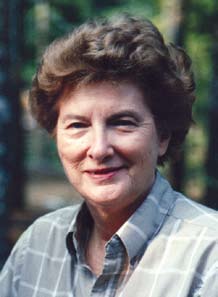 Ann Rice
Ann Rice
For two decades, physicists visiting the KITP have been treated to stunning views of the Santa Ynez Mountains from a rental house on La Coronilla Drive near Santa Barbara’s Mesa district. The owners of that property, Ann and Myron (“Mike”) Rice, enjoyed cordial interactions with their physicist tenants and with KITP housing coordinator Monica Curry. That mutually gratifying, long-term relationship prompted Ann late last summer to phone Curry to explore how the gift of the house might benefit the KITP.
The $1.4 million proceeds from the property’s sale are being used to endow the “Drs. Ann and Myron Rice Family Fund for the Kavli Institute for Theoretical Physics.” Because the endowment was established in the form of a charitable remainder trust, Ann has also generously added a cash gift of $30,000 to enable the Family Fund to become operational in the spring of 2008.
The Family Fund enables families — especially those in which the physicist is also the mother of young children — to participate in the weeks- and months-long collaborative research opportunities that are the hallmark of KITP programming.
KITP Director David Gross noted that the percentage of KITP participants who are women is roughly the same as the percentage of physicists who are women in the United States — i.e., 13 to 15 percent. “We aim to raise that percentage,” said Gross, “ultimately to 50 percent, and the Rice gift serves as an example nationally of the kind of effort required to make the profession more attractive to women.”
The Family Fund was the brainchild of KITP development director Sarah Vaughan, who at the time of the Rice call to Curry, had already extensively explored with Curry the difficulties would-be program participants, most notably women, face when uprooting children from the carefully crafted childcare and schooling routines tailored to their home base.
Questionnaire after questionnaire returned by women physicists at the end of their participation in KITP programs noted how hard it had been to make from afar expensive arrangements for the housing, care, schooling, and transport of children that enable the physicist to immerse herself in the intense, collaborative, face-to-face research experience afforded to visitors.
Ann Rice, an expert on personal and familial finance, said, “I began by thinking that La Coronilla could serve as a permanent temporary address for physicists — as a rental property gifted to the KITP. But as soon as I learned of the prospect of a Family Fund, I thought it would be a wonderfully appropriate memorial for Mike, who was so encouraging and supportive of my own career development. Both of us have had a life-long commitment to the value of higher education. With this gift we are enabling higher educators themselves to develop insight through collaboration. It pleases me that we have found a way to help that is deeply in keeping with our core values as a couple.”
With a BA degree from the former Georgia State College for Women (GSCW), Ann Smith began teaching high school home economics when she was 19 years old. All the while teaching at the institutions she attended, she went on to complete a 1951 MS degree from the University of Georgia, and a PhD from Florida State University in economics, sociology and personal finance.
The latter degree was conferred in 1964, the year that she joined the UCSB home economics faculty as a teacher of family finance and investment. The author of two college textbooks on family management, and more than 50 articles and one book chapter related to teaching financial management, Rice also served on the board of the Consumers Union. Honored for her service on the advisory board of the U.S. Department of Agriculture, she was named Alumna of the Year by Georgia College and State University (formerly GSCW).
Born “Myron,” but known as “Mike” thereafter, Rice, an Ohio native, attended Miami University, where he obtained bachelor and master degrees in business, and Cleveland College, where he earned a doctor of chiropractic. After enlisting in the U.S. Army Air Force in 1941 and serving in Europe during World War II, Mike met and married Ann. They were married for 52 years.
A skilled metal smith, Mike designed orthopedic footwear for children. In addition to his chiropractic practice, he owned and operated a trucking company. Awarded a Utah State University doctorate in business education in 1972, he served as professor at Santa Barbara City College for 20 years, where, in addition to teaching, he chaired the business department and supervised the work experience programs. He also helped to establish the graduate program at Brooks Institute, where he taught fledgling professional photographers how to make a business of their art.
UCSB Chancellor Henry Yang said, “I am so impressed with Ann and Mike Rice’s evident commitment to what higher education can do to better people’s lives. Thank you, Dr. Rice, for your generosity to UCSB and the KITP. UCSB is fortunate in our long relationship, beginning when you taught home economics in 1964 and extending to your graciously endowing this fund that will benefit physicists who are also parents visiting the KITP.”
Gross said, “We are very grateful to have the means to level a little the playing field between men and women theoretical physicists who are parenting young children. Yes, we also expect that the fund will aid male physicists who are operating as single parents or whose visit to the KITP requires extra resources to support their family unit. But the main advantage of this wonderful gift is that it enables us better to welcome women physicists by offering to offset the added challenges of their leaving home with children in tow in order to do research at the KITP."
“I want to add how impressed I am, Dr. Rice, with your professional accomplishments, achieved in an era, not so long ago, when equal opportunity between the genders not only did not exist, but had yet to be conceived as a worthy goal. Thank you, Dr. Rice; you have made the KITP more family-friendly.”

The Family Fund addresses the following needs: appropriate housing, childcare and schooling, and transportation.
Housing
According to Curry, whose job it is to match physicists to accommodations, families obviously require more, and therefore more expensive, space than the lone physicist or couple. Families generally can’t be accommodated in a moderately priced rooming-house setting because children are likely to disrupt other inhabitants. And the requirement for more space often includes, in addition to room for children, room for an auxiliary childcare provider, whether nanny or relative.
Another housing hurdle is seasonal. Summer means school vacations, when physicists and their school-age children don’t have classes. But summer also means higher prices for rentals in what is arguably one of America’s most attractive vacation destinations. The Family Fund can be used to offset this seasonal cost differential.
Care and Education
Then there is the formidable challenge of finding and paying for reputable and reliable child-care and schooling away from home.
The Family Fund will address this need directly through subsidies, as well as indirectly through staff support to compile and maintain a password-protected alcove on the KITP home page. Parents can access this resource in conjunction with a “wiki,” a forum (or blog) to promote online information exchanges among parent physicists to enable assessment of local child-care and schooling options.
Perhaps the least obvious of the additional costs the Family Fund can address entails paying to preserve the daycare or schooling provision that parents have already secured at home. A parent might well feel compelled to choose preserving such a service (often hard-won) over risking its loss, through payment interruption, in order to advance a research career.
Transportation
Curry notes that another need women physicists, with or without children, have (in contrast to men) is for safe transportation. Frequently, men can comfortably bike at night between the KITP and their accommodations. But the same route may be questionable, in terms of safety for biking women, thereby necessitating extra funds for a rental car or public transportation. Children also require transportation to daycare or school or summer camp. Finally, there is the cost of bringing children and possibly the nanny to Santa Barbara and back.
The Family Fund, in short, enables the KITP to adapt its mission as a retreat facility for the advancement of scientific research to the challenges of modern parenting and two-career families.
